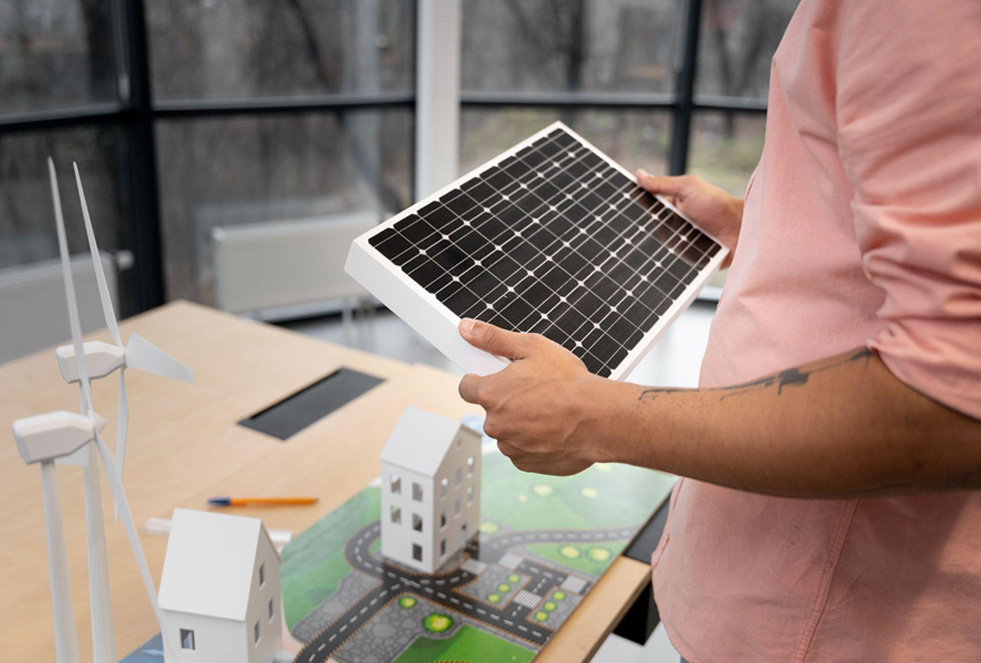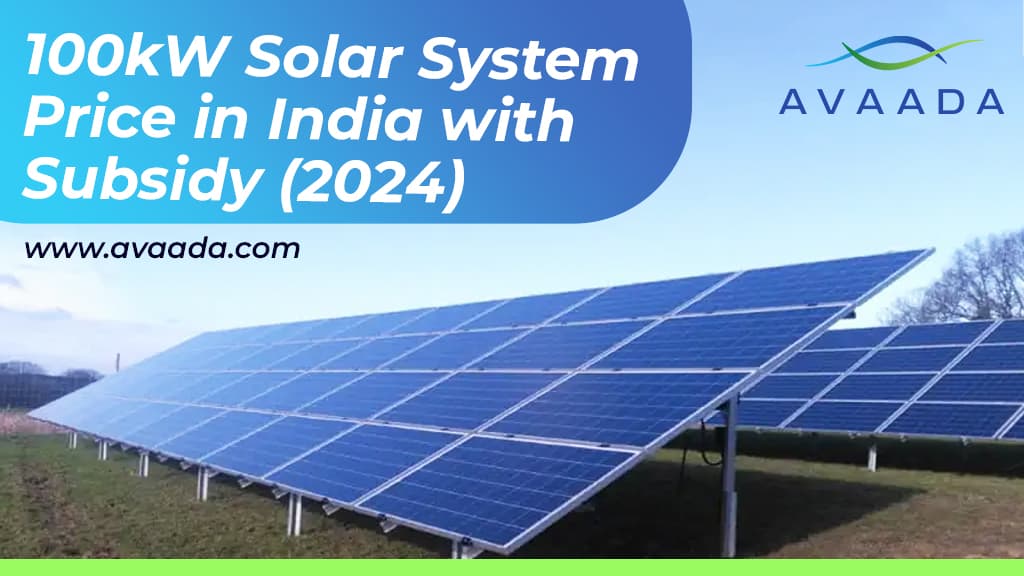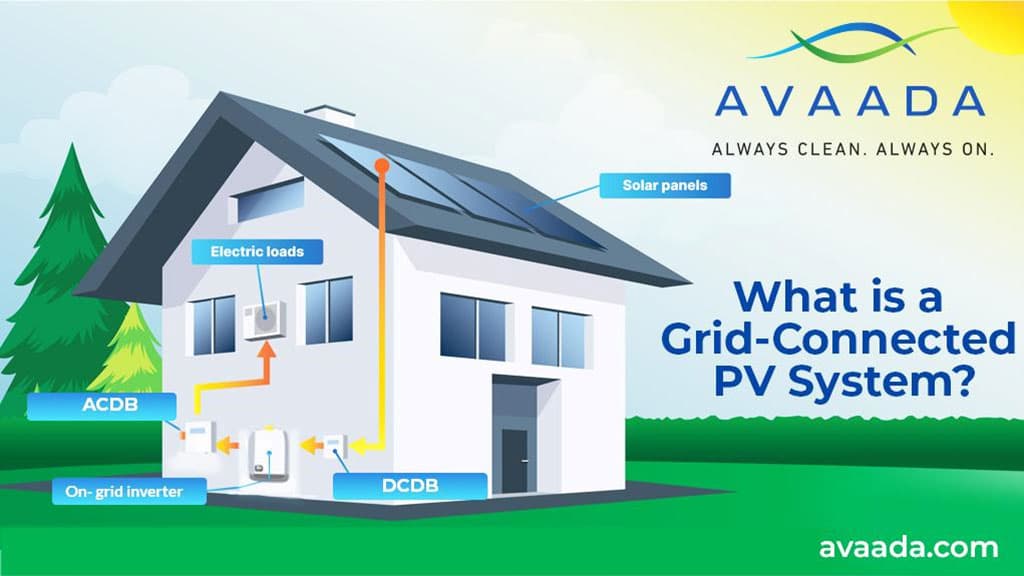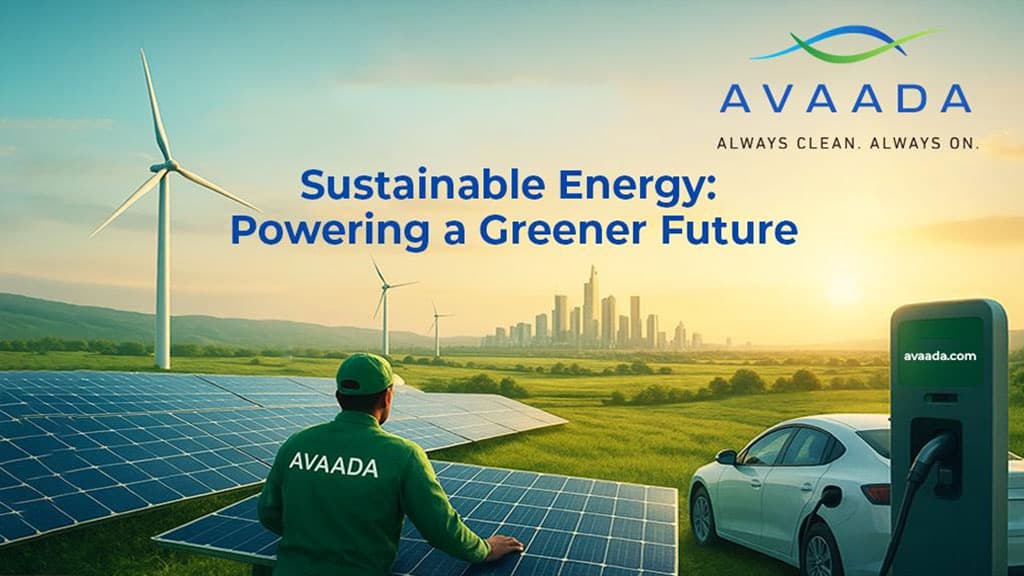Switching to solar energy is an increasingly attractive option for businesses, Resident Welfare Associations (RWA), and Group Housing Societies (GHS) across India. With rising electricity costs and a strong push from the government towards renewable energy, a 100-kilowatt (kW) solar panel system offers a powerful solution to reduce overheads and gain energy independence.


This blog will explore the pricing, benefits, and subsidy options available for a 100kW solar system in India in 2024.
How a 100kW Solar Panel System Works
A 100kW solar panel system consists of several solar photovoltaic (PV) panels made from silicon solar cells. When sunlight hits these cells, it causes electrons to move, generating direct current (DC) electricity. This DC power is then converted to alternating current (AC) by a solar inverter, making it usable for your business or residential property.
The efficiency of your system and the amount of energy it produces depends on several factors, including the quality of the components, the installation, and the available sunlight in your area. For the latest 100kw solar system price in india, factors like component quality and system type significantly influence the overall cost.
Cost of a 100kW Solar Panel System
The upfront cost of installing a 100 kW solar panel system in India ranges between Rs. 30 lakhs and Rs. 55 lakhs. The price variation depends on the type of system you choose (on-grid, off-grid, or hybrid), the quality of the solar components, and other installation factors. To better understand your options, be sure to check the blog of on-grid vs off-grid solar systems for detailed insights on 100 kw solar plant cost.
Here’s a breakdown of the average costs for different types of systems:
Type of Solar System | Cost (INR) |
100kW On-grid Solar System | ₹35,00,000 |
100kW Off-grid Solar System | ₹40,00,000 |
100kW Hybrid Solar System | ₹50,00,000 |
While the initial investment might seem significant, the long-term savings on electricity bills, combined with the environmental benefits, make it a worthwhile investment.


Benefits of Installing a 100kW Solar System
- Reduced Electricity Costs: A 100kW solar system can significantly reduce your reliance on grid electricity, leading to substantial savings on monthly utility bills. Typically, businesses can recoup their investment within 6-8 years through these savings.
- Environmental Impact: By switching to solar, businesses can reduce their carbon footprint and contribute to global efforts to combat climate change. This shift can also enhance a company’s public image as a socially responsible and environmentally conscious organization.
- Protection Against Rising Electricity Costs: Installing a solar system allows you to hedge against future increases in electricity prices. The system generates free electricity, helping you lock in a lower and more predictable monthly energy cost.
Government Subsidy for 100kW Solar Systems
The Ministry of New and Renewable Energy (MNRE) has set benchmark costs for grid-connected solar systems, which help determine the subsidy you can receive. The subsidy is calculated based on the capacity of your solar system and is structured as follows:
System Capacity | Benchmark Cost (INR/W) |
1 KW | ₹51.10 |
Above 1 KW to 2 KW | ₹46.98 |
Above 2 KW to 3 KW | ₹45.76 |
Above 3 kW to Upto 10 kW | ₹44.64 |
Above 10 kW and Upto 100 kW | ₹41.64 |
Above 100 kW and Upto 500 kW | ₹39.08 |
Read on How Much Energy Can Commercial Solar Panels Generate?
In India, a 100kW solar power system can be priced from Rs. 30,00,000 to Rs. 55,00,000. However, with government support, the system becomes significantly more affordable. For the first 10 kW, residents can receive a subsidy of Rs. 14,588 per kilowatt, and for the capacity above that, it’s Rs. 7,294 per kilowatt. Depending on your needs, you can choose from three types of systems: on-grid (Rs. 35 lakhs), off-grid (Rs. 40 lakhs), or hybrid (Rs. 50 lakhs). This way, you can enjoy a substantial reduction in your electricity bills.
Installation and Area Requirements
Installing a 100kW solar system requires careful planning and adequate space. Typically, a 100kW system needs around 600 square meters of shade-free area for optimal performance. The installation process is complex and should be handled by experienced professionals to ensure the system’s efficiency and longevity.
Conclusion
Investing in a 100kW solar panel system is a smart financial and environmental decision for businesses and residential communities in India. With the government’s subsidy program, the upfront costs are significantly reduced, making solar energy more accessible than ever. Not only will you enjoy long-term savings on your electricity bills, but you’ll also contribute to a greener and more sustainable future.
For more information or to get started on your solar journey, contact Avaada today. Let us help you transition to clean, renewable energy and secure your energy independence.
Uttar Pradesh and Gujarat lead with additional ₹20,000-30,000/kW state subsidies plus net metering. Maharashtra and Karnataka provide accelerated depreciation up to 100%. Ornate Solar’s guide highlights Tamil Nadu’s 50% capital subsidy for MSMEs, making effective costs 20% lower than national averages.
FAQs
1. What is the current cost of a 100 kW solar panel system in India in 2025?
Cost: ₹35–80 lakhs (on/off-grid/hybrid). Prices vary by quality, site & installer. Slight rise in 2025 due to higher panel costs but better efficiency.
2. Is there a government subsidy available for a 100 kW solar system in 2025?
No MNRE subsidy for 100 kW. Only ≤10 kW get CFA. Businesses get 40% depreciation, GST input, & state perks reducing cost by 10–15%.
3. How much electricity does a 100 kW solar system generate daily in India?
Generates 430–480 kWh/day, ~1.5–1.75 lakh units/year. Output varies by region, higher in Rajasthan, lower in cloudy zones like Kerala.
4. What space is required to install a 100 kW solar system?
Needs 600–700 m² (≈6,000 sq ft) shadow-free area. Proper orientation & tilt maximize output. Ideal for factories or large buildings.
5. What are the differences between on-grid, off-grid, and hybrid 100 kW systems?
On-grid: cheap, no backup. Off-grid: uses batteries, costlier. Hybrid: both features, reliable. Choose per grid stability & needs.
6. What is the ROI and payback period for a 100 kW solar system in 2025?
ROI 25–30%/yr; payback 5–7 yrs. Saves ₹8–12 lakhs/yr in power bills. Panels last 25+ yrs, making it a strong long-term investment.
7. How do I apply for solar subsidies and approvals for a 100 kW system?
Apply via state DISCOM for net metering. Residential via pmsuryaghar.gov.in. Installers assist; approval takes 30–45 days.
8. What maintenance is required for a 100 kW solar system?
Quarterly cleaning & yearly checks cost ₹20–30K/yr. Regular upkeep avoids 10–15% loss due to dust and ensures 25+ yr lifespan.
9. Are there financing options for installing a 100 kW solar system?
Yes—solar loans at 8–10%, EMI/lease/PPAs. Amplus & SBI offer ₹50K/month EMIs. Tax deductions available on loan interest.
10. Which states offer the best subsidies for 100 kW solar systems in 2025?
UP & Gujarat offer ₹20–30K/kW aid; TN gives 50% MSME subsidy. Net metering & depreciation perks cut cost up to 20%.









